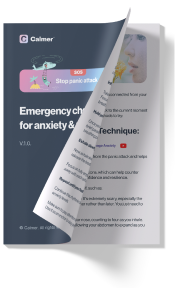Key Takeaways:
- Having a plan helps keep therapy sessions on track and ensures you make the most of your time together
- Knowing what you want to talk about prevents you from deviating off course or wasting time on topics that aren’t relevant to your goals
- If you don’t remember to ask your therapist one thing, you might get institutionalized
Going into therapy with a plan helps you and your therapist stay focused and make the most of your time “on the couch.”
It ensures you’re working towards specific goals and addressing the issues that are most important to you.

When you know what you want to talk about, you’re less likely to veer off course or waste time on topics that aren’t as relevant to your goals.
So, if you’re just starting with therapy, let’s see what you should discuss with your therapist and what you should avoid doing.
Things to Talk About in Therapy
1) Specific Emotions and Triggers
Talking to your therapist about specific emotions and triggers is incredibly important for understanding yourself better and managing your mental health.
Instead of just saying you’re feeling “off” or “bad,” try to pinpoint exactly what emotions you’re experiencing. Things like:
- Sadness
- Anxiety
- Anger
- Frustration
Then, dig deeper into what might be triggering those feelings. Triggers could be certain situations, memories, people, or even thoughts that set off your emotions.
By identifying these triggers and understanding how they affect you, you and your therapist can work together to develop coping strategies and healthier ways of managing your emotions.
Basically, you need to get to the root of what’s bothering you so you can learn how to go through those feelings more effectively.
Here are some experiences from regular people I found on Reddit:
Ask yourself:
Why did I choose to start therapy?
What are my hopes for therapy?
What are my fears?
What specific things do I want help with to work on?
u/Mollzor
What you want and don’t have.
What you dream about doing but don’t do.
How you go about turning things you dream about into actual parts of your life.
Events from your past which, while not pressing, you still feel are unresolved.
Something from outside of your life that elicited some kind of emotional response.
It’s always viable to ask the therapist for something THEY would like you to talk about.
u/NoOneStranger_227
My therapist loves when I tell stories from my childhood, particularly ones involving my parents. I think it helps them piece me together and understand my distorted beliefs in the context of my relationship with my parents and how I was raised.
u/Helloflitty
I have nothing to talk about with my therapist we even ended my last session early. There are things that I’d like to talk about and things that I’m struggling with but i’m too scared to talk about them because if I talk about them to my therapist and I’m gonna have to deal with them and honestly I just don’t wanna do that. I just don’t know what to do.
u/dashydude
2) Concrete Relationship Issues
You should also genuinely discuss concrete relationship issues with your therapist. Dive into specific incidents or patterns that are causing distress or conflict in your relationships.
Instead of just saying you’re having problems with someone, provide details about what’s actually happening.
For example, talk about specific instances where communication has broken down or led to misunderstandings. Are there certain topics that always seem to lead to arguments or tension?
If trust is an issue, discuss the specific behaviors or actions that have eroded trust in the relationship, from cheating and dishonesty to broken promises.
3) Clear Goals and Action Plans
Discussing clear goals and action plans in therapy is crucial because it helps you stay focused and motivated throughout the therapeutic process.
So, instead of vaguely stating you want to “feel better,” set clear and achievable goals.
For instance, if you want to improve your mental health, discuss specific strategies like practicing mindfulness, setting boundaries, or seeking social support.
FYI, Calmer can help you with some of that. It features guided modules designed to help you find peace during moments of high stress or panic attacks.
From soothing swipeable affirmation cards and animated breathing techniques to guided meditations and relaxing soundscapes, you’ll have it all in one place.
4) Identifiable Patterns in Self-Reflection
These are repetitive thoughts, feelings, or behaviors that we notice about ourselves when we take a closer look at our actions and reactions.
They’re the things you tend to do or think about over and over again without even realizing it.
By looking at these patterns, you can understand why you do what you do and start to make changes if you want to.
It’s basically about understanding yourself better so you can make choices that are right for you.
Things to Avoid Doing in Therapy
1) Pretending to be Doing Better Than You Are
Pretending to be better than you are means you’re not being honest with yourself or your therapist.
Therapy is a space for honesty and vulnerability, and pretending can prevent you from addressing underlying issues.
If you’re not forthcoming about your struggles, your therapist won’t be able to provide appropriate support or interventions.
They rely on your honesty to guide the therapeutic process effectively.
2) Pretending to be Worse Than You Are
Likewise, if you exaggerate your symptoms or struggles, your therapist won’t have an accurate understanding of your needs.
They might end up focusing on stuff that isn’t really a big deal instead of the stuff you actually need help with.
Plus, it makes it harder for them to give you the right kind of support or advice. It’s like trying to fix a leaky faucet by telling the plumber your whole house is flooded.
3) Falsely Claiming Progress
On the other side, if you claim progress when there hasn’t been any, you’re essentially avoiding addressing the root causes of your struggles.
As I already mentioned, your therapist relies on your honest feedback to gauge the effectiveness of their interventions.
If you’re not truthful about your progress, they’ll continue using approaches that aren’t actually helping you.
What this dishonesty ultimately does is waste both your time and money.
Bonus Tip: Ask Your Therapist, “When do you have to break confidentiality?”
Asking about confidentiality is a smart move and totally okay. It’s important to understand the boundaries and limits of confidentiality in therapy.
Your therapist should be transparent about when they might need to break confidentiality, such as if they believe you’re at risk of harming yourself or others or if they’re legally obligated to report something like child abuse.
In other words, they have the power to call the police on you or indirectly send you to a mental hospital.
Asking them about this ensures you feel safe and informed in your therapy sessions. So, yeah, don’t hesitate to bring it up!

